单词教学公开课 PPT
外研版五年级英语上册《Module 4 Unit 1》课堂教学课件PPT小学公开课

外研版 英语 五年级上册Module 4Unit 1 Mum bought a new T-shirt for me.第一课时第二课时第一课时Do you like red T-shirts? Yes, I do. Doyou like theblack shorts?No, I don't.Do you likebananas?用下列单词造句Hello! I’m Tutu! My mum bought me lots of clothes, I like them very much!Let’s see!My mum bought me a pair of ,a pair of and a pair of .a pair oftrousersI’m wearing my new shorts! They are nice!and washed them.My friend Sam got new clothes, too. Let’s see.Ms Smart: ____ you like this ______ shorts, Sam? Sam: No, I don‘t want shorts. I want _______.Amy: Mum ______ new clothes for Sam!Lingling: Ha ha…Listen and fill in the blanks.Do pair of trousersboughtMs Smart: Do you like this pair of shorts, Sam? Sam: No, I don‘t want shorts. I want trousers. Amy: Mum bought new clothes for Sam!Lingling: Ha ha…Listen and read after it.Do you like this T-shirt?No, I don’t want a T-shirt. I want a shirt.Group work.Do you…No…Listen, read and act out.Mum bout new clothes for Sam.But Amy and Sam are arguing!Let’s see what happened.Listen and answer.1. What’s the matter?Amy and Sam are arguing about a T- shirt.2. Did mum wash Lingling’s T-shirt?No, she didn’t.Read and underline.Sam:That's my T-shirt!Amy:No! It's my T-shirt.Ms Smart:Don't argue! What's the matter?Amy:Sam took my T-shirt. He wants to wear it.Sam:But it isn't your T-shirt. Mum bought itfor me.Amy:No, she didn't. Mum bought a new T-shirt for me.Ms Smart :Your red T-shirts are on the line. I washed them for you. Look!Sam :Did you wash Lingling's T-shirt?No, I didn't. Lingling's T-shirt is clean. She didn't wear it.Ms Smart:Sam:I'm so sorry, Lingling! Amy:I'm sorry too.Lingling:That's OK.Lingling:Look, this is my new kite. Amy:Oh, it's beautiful!Sam:The cat is so cute!Lingling:Let's go and fly it. Amy and Sam:Great!What’s the matter?此句是一个询问某人/某物怎么啦的句型。
外研版五年级英语上册《Module2 Unit1》教学课件PPT小学公开课

Module 2外研版 三起 英语 五年级 上册Unit 1 What did you buy?Learning goals能听、说、认读单词:list, er, need, first, can, lost, cheese, any ✔能够运用句型:--How many bananas did you buy?--We didn't buy any bananas. We bought twelve eggs.✔能运用短语:how much✔What did you buy?list 清单 shopping list 购物清单What did you buy ?Where did you buythem?I’ll makea shopping list.What did Sam’s father want?Did Sam buy it?Where is it?He wanted some fruit.No.He ate it all.What did Sam’s father give him?He gave him a shopping list.Listen and answerWhich are correct?Sam bought some fruit.( )Sam’s father ate some fruit.( )Sam ate all the fruit.( )TSam made the list.( ) FFTNew wordsneedThey need food for lunch.They need water.They______their way yesterday.lostlose 的过去式lost can 情态动词+动词原形 能The animal can tell them the way.can +动词原形I can some apples.buyFirst , we need six bananas. Then …first …(then …)First , we can buy six bananas.First, turn left. Then, turn right.2. How many bananas did they need ?At home1. What did they need ?At the supermarket 3.What did Mr Smart lose ?4. How many apples did they need ?5. How many bananas did they buy ?6. How much eggs did they buy ?Listen and answer the following questionsFood for their picnic.The shopping list.Six.Four.They didn't buy any bananas.Twelve.shoppingmade a shoppinglist l o st h o w m a n yh o w m u c h b o u g h t ……We need food for our picnic.A: What did you buy?B: I bought A: Did you buy any four oranges .bananas.B: No, I didn't buy any bananas.shopping listbanana s apple s orange spear s egg scheeseany 用于否定句一些some用于肯定句或疑问句A: Did you buy any bananas?B: Yes, I bought six bananas.C: No, I bought ten apples.some any1. We bought __________ bananas.2. There are __________ boys.3. Did you buy _________ cakes?4. I didn’t buy _________ apples.some some any anyapple spear segg sbanana swatermelon sorange s1. How many … did you buy ? …New sentenceswatermeatmilkcheesefish 鱼肉rice2. How much …did you buy ?…不可数名词可数名词1.______ ______tea do you want?2.______ ______bananas do you want?3.______ ______apples do you need?4.______ ______rice do you need?how many how much How many How many How much How muchNew sentencesHow many bananas did you buy?We didn't buy any bananas. Webought twelve eggs.Listen and sayWhat did you buy?I bought some fruits.How many_______ did you buy?I bought _______ ________.applesthree applesHow many_______ did you buy?I bought _______ ________.bananassix bananasDid you buy _______ ______?I didin‘t buy _____ _____.anyoranges any orangesHow much _______ do you want?I want __________________.cheesehalf a kilo of cheese3. How much … did you buy ?1. What did you buy?--I/We bought+某物.2. How many … did you buy ?不可数名词可数名词how many how muchshoppingmade a shopping listl o st h o w m a n yh o w m u c h b o u g h t ……1、练习复述2. Read “Activity 2 Listen, read and act out”.3. Do “Activity 4 Practise” with your friends.谢谢观看 Thank You。
高中英语词汇公开课(原创)ppt课件

感谢您的耐心观看
汇报人:
授课方式
词汇分类:按词性、词义等分类讲解,便于学生系统掌握 词根词缀:通过词根词缀的讲解,帮助学生理解词汇构成和记忆单词 语境记忆:将词汇放入语境中,让学生通过实际运用来记忆单词 练习巩固:提供相关练习,加强学生对词汇的掌握和理解
课程考核
课堂表现:根据学 生在课堂上的互动 和表现进行评估
学会常用语法和句型,提高 写作水平
培养英语思维习惯,增强语 感
掌握高频词汇,提高阅读速 度
激发学习兴趣和动力,提高 英语成绩
为未来考试打下基础
掌握更多词汇
提高阅读理解能力
增强写作表达能力
提升口语交流能力
课程亮点
专业教师授课
经验丰富:拥有多年教学经验的教师授课 授课内容:根据学生实际情况设计课程 授课方式:采用多种教学方法,如讲解、讨论、案例分析等 授课效果:能够帮助学生掌握英语词汇知识,提高英语应用能力
作业完成情况:定 期布置的词汇练习 和阅读理解等作业
期中考试:进行词 汇和阅读理解的测 试,检验学生的学 习成果
期末考试:全面考 察学生的词汇掌握 程度和英语应用能 力
课程资源
课本:提供基础 的知识和练习
课件:精简重点, 方便学生复习和 预习
视频:提供更直观 的学习资源,包括 发音、语法等
图片:帮助学生 更好地理解词汇 的含义和用法
公开课的目的和 意义
掌握3500个英语单词
课程目标
能够正确使用单词,不出现语法错误
了解单词的词性、词义、用法等
能够灵活运用单词进行口语和书面表达
高中生
适用人群
英语老师
想要提高英语词汇水平的人群
人教PEP版四年级英语上册《Unit 5》全单元教学课件PPT优秀公开课课件
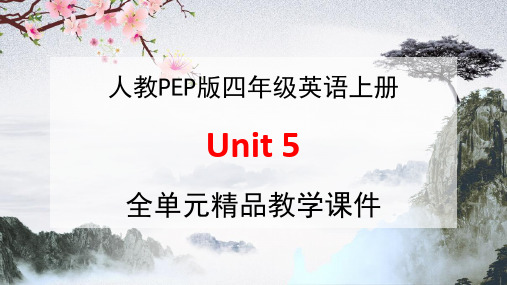
What’s for dinner? … for dinner.
Ask and answer in pairs.
—What would you like for dinner? —I’d like some…, please. /Some…, please.
I’d like some soup and bread, please.
Dinner is ready !
Thanks!
Guess and say
Dinner’s ready. What’s for dinner? Can you guess? What’s for dinner? Soup for dinner.
Dinner’s ready!
dinner 正餐 ready 准备好
Thanks!
Language points
1. — What’s for dinner?
【详解】此句型用来询问用餐的食物。what’s是what is的缩写 形式。for在此句中意为“当作;作为”。 句型结构: What’s for + 三餐名词? eg. — What’s for breakfast? — Bread and milk, please. — What’s for lunch? — Fish and rice, please.
beef ¥20 chicken ¥15
noodles ¥8 soup ¥2 vegetables ¥5
rice ¥1 fish ¥10
juice ¥5 milk ¥2 bread ¥1
I’d like some vegetables, please.
英语公开课成品(课堂PPT)
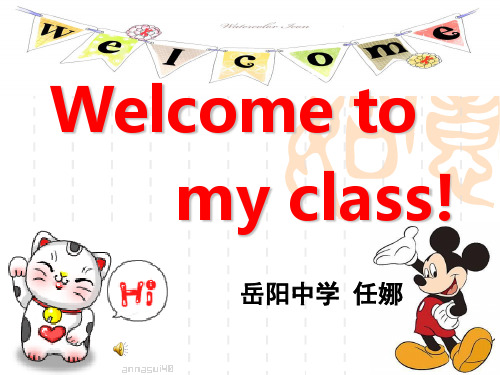
Discuss
What cultural differences do you know?
24
Living in another country
▪ Look at the introduction、the picture and the title of the speech on page19. Then answer the questions.
18
China through American eyes
19
China through American eyes
20
China through American eyes
21
China through American eyes
22
China through American eyes
2. What clothes does Brad wear at school in China?
3. What exciting experience did Brad have at Halloween?
4. What do Americans eat at Thanksgiving? 5. What did Brad learn from his experience
1. Who is Brad Li? 2. Which country did he go to? 3. Why did he go there? 4. What did he find different about the US?
Have a guess and choose the possible answers. a. language b. school c. food d. weather e. festivals
牛津译林版三年级下册英语第二单元in the library公开课教学PPT课件

rubber run 跑;跑步 bus Don’t run in the bus.
meet sleep 睡觉
eat 吃 sweet I eat the sweet.
shout 喊;叫
shout 喊;叫
I win我赢了
Why didn’t I win ?
小练习:( B ) 当你的朋友饿了,你可以说:___________ A.Would you like a doll? B.Would you like some rice?
B. rice意为“米饭”。
Dialogue
Hello,Yang Ling! Don’t shout, Liu Tao. Don’t run, Liu Tao.
Class(班级)______ Name(姓名)__________
1. I can say ‘Don’t …!’ 我会说并会用“不要……!”
2. I know and I can read five new words. 我认识并会读5个新单词。
3. I know and I can write “eat. run .talk”. 我认识并会写3个新单词。
Unit 2
In the library!
Introduce
---Look, who’s this boy? ---Liu Tao. ---Yes. Where does Liu Tao meet his friend Yang Ling? ---In the library.
Words
in /ɪn/
Words
sleep /sli:p/
动词,意为“睡觉”。形近词:sheep 绵羊。
小学英语沪教版深圳版四年级上册单词含语音ppt课件
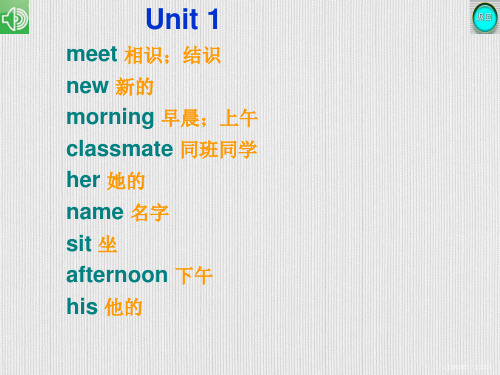
Unit 9
need 需要
where 哪里
in 在……里面
box 盒子;箱子
give 给
plate 盘子;碟子
on 在……上面
table 桌子
lunch 午餐
under 在……下面
为深入学习习近平新时代中国特色社 会主义 思想和 党的十 九大精 神,贯彻 全国教 育大会 精神,充 分发挥 中小学 图书室 育人功 能
drink 喝
为深入学习习近平新时代中国特色社 会主义 思想和 党的十 九大精 神,贯彻 全国教 育大会 精神,充 分发挥 中小学 图书室 育人功 能
Unit 4
any 任何的
cousin 表兄弟;表姐妹;堂兄弟;堂姐妹
family 家庭
parent 父亲;母亲
grandparent (外)祖父;(外)祖母
Unit 6
nurse 护士
fireman 消防员(复数firemen)
teacher 老师
doctor 医生
bus drive 公共汽车司机
kid 小孩
so 如此;很;所以
fire 火;火灾
people 人;人们
job 工作;职业
为深入学习习近平新时代中国特色社 会主义 思想和 党的十 九大精 神,贯彻 全国教 育大会 精神,充 分发挥 中小学 图书室 育人功 能
play with 玩……
为深入学习习近平新时代中国特色社 会主义 思想和 党的十 九大精 神,贯彻 全国教 育大会 精神,充 分发挥 中小学 图书室 育人功 能
Unit 7
school 学校
office 办公室
busy 忙碌的;繁忙的
computer 计算机;电脑
科普版六年级英语上册《Lesson 3 第3课时》课堂教学课件PPT小学公开课
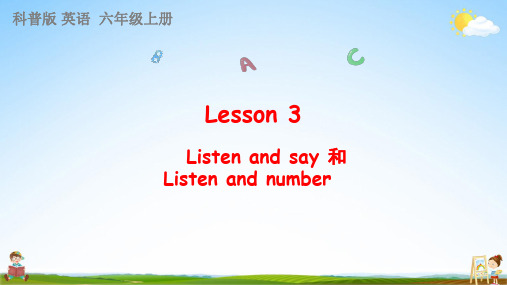
Lesson 3 Listen and say 和Listen and number科普版 英语 六年级上册warmcoolhot cold [wɔ:m][hɒt][kuːl] [kəʊld]温暖的炎热的寒冷的凉快的Warm upWhat ____ the weather_______tomorrow?It _____________.will be like will be warmWhat _____ the weather _____ tomorrow? It ___________.will be likewill be coolWhat _____ the weather ______ tomorrow?It ___________.will be like will be hotIt _______.What ______ the weather ______ tomorrow?will be cold will be likeListen and sayCanberraflag Kangaroo Sydney Opera HouseLead inListen and say试着自己朗读。
Listen and sayHi, John! The winter holiday is coming. What are you going to do?We’re going to Australia.嗨,约翰! 寒假就要到了。
你打算做什么?我们要去澳大利亚。
Wow! What will the weather be like in ArrayAustralia?哇! 澳大利亚天气会怎么样?It will be sunny and hot. It’s summer in Australia now.天气将是晴朗和炎热的。
现在这是澳大利亚的夏天。
That’s great! You can swim in the sea there.Yes, and what about you, Lili?太好了!你可以在在那里海里游泳。
《Months of the Year》Days and Months .PPT公开课
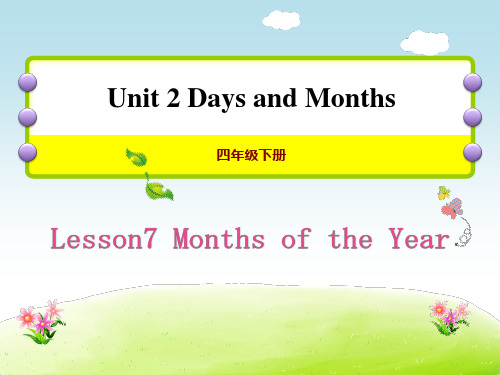
These are the twelve ________ of the year.
February → Feb.
/dɪ sembə(r)/ n.(名词) 十二月
It’s hot in June.
例句:We don’t go to school 这是一个由Whose 引导的特殊疑问句,询问某人的生日在某月。
二、单项选择。
1. — ____B____ your favourite fruit?
—My favourite fruit is the apple.
A. What
B. What’s
C. Which
2. These are the twelve ____C____ of the year. A. mouths B. month C. months
表示月份的名词的首字母必须大写。
/dʒuːn/ n.( 名词) 六月 例句:It’s hot in June.
在六月份天气炎热。 词形变化: June → Jun. ( 缩写词)
/dʒv laɪ/ n.( 名词) 七月 Steven’s birthday is _________ December.
It’s hot in June.
We have a two month holiday in July and August.
本节课我们学习了以下知识,请同学们一定加强巩固,以便能和同学们进行灵活交流哦!
Johns’ birthday is in February.
知识点 3 Whose birthday is in July? 谁的生日在七月?
一年有十二个月。 归类记忆法:day 天 week 星期 season 季节 year 年
【公开课课件】高中英语一轮复习词汇教学策略课件 (共44张PPT)

方法 监督 智慧地理记论忆词汇
逐词学习法
一词多义
√
1. 分层分级法 2. 基本义到衍生义法 语境化
基本义 概念
√
隐喻 思维
shock absorber
意识增进法
多词记忆
词汇知识网络化、结构化
单个词
释义 用法 搭配
词群
1. 话题分类 2. 正式/非正式概念 3. 词族概念
多词记忆
词汇知识网络化、结构化
3yo.ur稿art件icle长s b度efo:re 约Jun4e0208词? 汇
4IY’mo.ulro交so, k稿ing日for期wa:rd 6to月he2a8ri日ng 前from天you.
Li Hua
高考
高中英语词汇教学 词汇教学策略
词汇教学内容
词汇教学实践
教学模式原本是阶梯,而不是鸟笼
welcome articles about how Americans spend their holidays
1an.d栏fes目tiva介ls,绍and the life of American high school students.
2Yano.du ic稿nafon件rwmr内aitteiv容aen. y4t0h0inwgorredlesvwaonut lsdobloenfginea.sCito’suilndtewreeshtianvge
重点)
年度
总词量 短文词量 试题词量
高 2007
2014 1425
589
语用能力 考 2008
命 2009
1981 1941
1283 1260
698 681
题 趋
2适01当0 减少1客921观题,13增97加有助524于 2学01生1 思维1表956达的主13观46题 610
常用英语单词教学(共43张PPT)

Girl
[ɡə:l]
二、认识人物、职业
医生
农民
爸爸
doctor
[dɔktə]
farmer
['fɑ:mə]
father
['fɑ:ðə]
二、认识人物、职业
裁缝
圣诞老人
百合花
Tailor
[teilə]
Santa
['sæntə]
Lily
['lili]
二、认识人物、职业
女巫/ 巫婆
驾驶员
witch
[witʃ]
stocking
['stɔkiŋ]
十、认识天气、冷热
下雨的/多雨的/阴雨的 有暴风雨的
晴天
rainy
['reini]
stormy
['stɔ:mi]
sunny
['sʌni]
十、认识天气、冷热
多云
多雪
有风
cloudy
['klaudi]
snowy
[snəui]
windy
['windi]
十、认识天气、冷热
hat
[hæ t]
九、认识衣物
衬衫/衬衣
凉鞋
围巾
shirt
[ʃə:t]
sandals
[sæ ndlz]
scarf
[skɑ:f]
九、认识衣物
裙子
鞋子
短裤
skirt
[skə:t]
shoes
[ʃu:z]
shorts
[ʃɔ:ts]
九、认识衣物
毛衣
短袜
长袜
sweater
['swetə]
外研版五年级英语上册《Module 10 Unit 2》课堂教学课件PPT小学公开课

外研版 英语 五年级上册Module 10Unit 2 Don’t shout, please!第一课时第二课时say is do playfind 快速说出单词的过去式。
第一课时What do they mean?Don’t shout.Don’t walk.“Don't”意为:禁止、命令、劝告,通常为向听话者发出命令、提出要求或建议。
Don't run.Don't speak.Baby’s mother : Don’ t shout,please! My baby issleeping.Amy : Sorry. I didn’ t know.Listen and read.Ms Smart: Don’ t climb the tree! It’s dangerous. Sam: Sorry, Mum.Ms Smart: Don’t walk on the grass, Amy !Amy: Sorry. Let’ s go and see the pandas, Sam!Sam: Great! Let’s go!Why can't they shout in the zoo?Becausethe baby is sleeping.Answer the questions.Why can't they climb the tree?Because it's dangerous.危险的dangerousWhy can't they walk on the grass?Because it will hurt grass.Role play.Don’t…!It’s…Sorry…自编情景对话。
A: Don’t…B: Sorry…Look and write. Then say.Don't climb the tree!Don’t walk on the grass!Don’t shout!Don’t swim in the river!一、用所给单词的正确形式填空。
外研版五年级英语上册《Module4 Unit2》教学课件PPT小学公开课
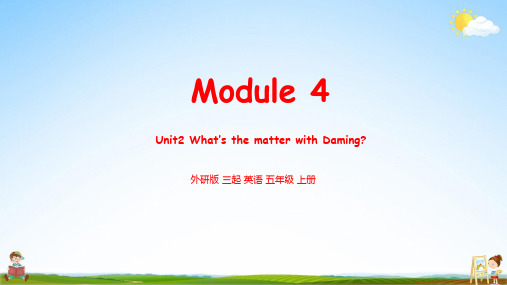
Module 4外研版 三起 英语 五年级 上册Unit2 What’s the matter with Daming?Learning goals能听、说、认读单词:sports, hey✔ 能够运用句型:1.What’s the matter with...?2.He/She lost his/her....✔What ‘s the matter?I lost my sheep.What’s the matter, Sue?What’s the matter with you?I can’t find my sock.And I lost my shoe.Don’t be so sad, Sue.Here are the things for you.Here is your lost sock.And your lost shoe.Listen and say.Then chant.Look, listen and say1.What’s the matter with Daming? He lost his bag.2.What was in Daming’s bag?His new sports shoe s.3.Where did he find this bag? He foundthis bag on the school bus. Listen and answerWhat’s the matter with Daming?He lost his bag.What’s in it?My new sportsshoes.sport s shoe s运动鞋Look! I found this bagon the school bus. These new sports shoes were in it.Hey,that’s my bag! And those are my shoes! Thank you.刚才的发现和状态Daming _____ (丢失)his bag. His new _____ ______(运动鞋) were in it. A boy ______(找到)it ______(in/ on) the school bus. He _____( give) it to him. Daming says “ thank you” to the boy. They ______(be) happy, haha.lost found on gave sports shoes wereRetell the dialogueSam’sA: What’s the matter with Sam?B: He lost _________.his T-shirt Look and write.Then ask and answer.Ben’sA: What’s the matter with Ben?B: He lost __________.his trousersBilly’sA: What’s the matter with Billy?B: He lost _______.his capSusan’sA: What’s the matter with Susan?B: She lost ____________.her schoolbagbagT-shirthatskirt任选两组,用What’s the matter with …? He/She…进行对话。
外研版六年级英语上册《Module 6 Unit 1》课堂教学课件PPT小学公开课

外研版 英语 六年级上册Module 6Unit 1 You’ve got a letter from New York.第一课时第二课时第一课时Sing a song: You’ve got …I have got...Look and say.Free talk.I have got many books.Have you got many books?What book have you got?I’ve got some books about China.I’ve got a book about the US.about 的用法小结表示“关于”。
表示“大约”。
This is a story abouttime.There’re about 40 students on the playground.Have you got a book about China?No, I haven’t.Yes, I have.Have you got a book about China?这是have 引导的一般疑问句,表示“某人有……吗?”have 要随主语的变化而变化,当主语是第三人称单数时,要用 has 。
— Have you got a pet dog?— Yes, I have./No, I haven’t.句型结构:Have/Has + 主语 + got + 其他?肯定回答:Yes, 主语 + have/has.否定回答:No, 主语 + haven’t/hasn’t.关于have /has got 的其他常用固定句式陈述句句型结构:主语 + have/has got + 其他.I have got a new bike.She has gota white dress.关于have /has got 的其他常用固定句式I haven’t got a blue T-shirt.He hasn’t got a book about Hua Mulan.否定句句型结构:主语 + have/has not got + 其他.have/has not 可以缩写为haven’t/hasn’t 。
